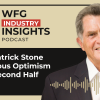
Dave Eisenberg is the CEO of Floored.
Age: 29
Degree, school: Psychology, Harvard
Location: New York City
Social media: LinkedIn, Twitter, Facebook

Dave Eisenberg relaxing over a glass of his favorite rum, Zacapa 23. Photo by his old boss and close friend, Andy Dunn, who introduced him to the spirit.
What’s your favorite activity outside of work and why?
I love to play tennis whenever I can get access to courts in New York. When I was younger it was something I did competitively, so I have some muscle memory that I can rely on. Now that I’m a bit older it’s a great way to keep in shape and have a lot of fun.
What’s your favorite classic piece of literature and why?
Great question! My wife is a writer and she’s smiling because we both know I should be reading a lot more classic literature these days. I’m a big Dostoevsky fan, so I’d have to say “The Brothers Karamazov” is one of my favorites. I’m actually making my way (slowly) through Mark Twain’s writings, so we’ll have to see if he takes over the top spot …
Are you the first entrepreneur in your family?
Tech entrepreneur, yes; general entrepreneur, no. I have some wonderful entrepreneurial role models in my life. My maternal grandparents survived the Holocaust and started with nothing in the U.S. and set up a psychiatric practice out of their home.
My father’s parents passed away when he was young and he bootstrapped himself through college, later establishing his own medical practice. I have many examples of humble, hard-working entrepreneurs in my family who served as examples for me to try to create something of my own.
How’d you come up with the idea for your startup?
It was a combination of factors. I was coming off of two e-commerce-related startups and felt that novel, digital experiences were going to be at the core of most manufacturing and digital shopping experiences going forward … I had also been exposed to new technology in 3D scanning and 3D printing from working in Silicon Valley and felt that it might be possible to “capture the world” in 3D and then offer unique experiences on top of that data.
It turns out there’s a more immediate need for 3D solutions in the new development field, but that’s something we learned after a year of selling to the real estate industry.
Describe a time when you felt particularly insecure about the future of your company. How did you bounce back?
I think the first time I showed someone a 3D scan of a home and they said they would “definitely not” buy that information, it was like someone had dumped an ice bucket on my head. Then I went to the architect on the project who also said they would “definitely not” buy the 3D model and I went back (mildly hyperventilating) to our office.
This kind of event is pretty common in startups. Your initial instincts on product and go-to-market strategy are often wrong, and so you iterate and tweak. Ultimately, you bounce back because you believe in the vision, you believe in your team and you don’t hold strong product prejudices.
What would you describe as your company’s biggest victory since launching and why?
The launch of our own proprietary, photo-realistic graphics engine, Luma, was a huge internal victory point and really has been the primary feature that we have touted since we launched. It’s the type of product that a lot of people who see it say, “I didn’t think that was possible in the web.”
It helps us win deals, attract world-class software engineers and investment capital for investors who better understand where the 3D web is heading as a result of our efforts.
What’s been the biggest obstacle your business has encountered, and how have you dealt with it?
Real estate is an old industry, and old habits die hard. Purchasing print advertising, sending out direct mail, “e-flyers or e-blasts” and so on. Dollars from these old channels that are hard to track, static and tired need to flow to new methods like ours if we are to have a viable business.
The amount of education that we need to give to our customers is an ongoing obstacle: how 3D works, what’s new about it compared to the past, what is virtual reality; these are all important questions in our sales process.
We’ve tried to deal with the challenge by offering a better, faster, cheaper process in many cases than what our clients have used previously and that certainly helps ease them into the conversation!
What puzzles you most about the industry?
Persistent resistance to the idea of transparency in real estate. If the Internet and tech boom of the past 20 years has taught us anything, it’s that transparency (pricing, availability, networks, etc.) is good business.
I scratch my head at the developers, brokers and platforms that are trying to fight this trend online. They will lose, and the harder they fight against it, the uglier the outcome will be.

Dave holds up the winning entry to the Floored pumpkin carving contest. It’s of his co-founder, Judy He, who runs computer graphics at Floored. With a team full of 3D professionals, the competition was pretty stiff…
What is the most important lesson you’ve learned about building a business since launching your company?
Just because you want a business model to exist, doesn’t mean it should or will exist. We tried to shoehorn some of our early customers into a model that was attractive for us, but it didn’t really fit the way they think about marketing expenses, nor was it appealing to them in the long-term (we made it very appealing in the short term). So, once again, we listened to customers, learned, adapted and ultimately landed on a model that they love.
What’s the most overrated real estate technology?
This is a tough one. I think different constituents would have different answers (developer, architect, broker, consumer). In my estimation, I would say video tours are probably the most overrated in terms of how many people call them “real technology” and also in terms of how consumers actually value video tours.
How will the role of the real estate agent change over the next five years?
I’m certain that there will be fewer agents, overall, but that almost all of this contraction will happen at the low end of the market and with the least experienced agents.
I think the role is going to shift to be more consultative, more advisory, more focused on vertical interests where agents can build serious domain expertise. I think the role will be less focused on providing access to listings, home tours, transactional and other forms of financial data.
What motivates you more: power or money?
I guess influence would be my answer, which is certainly a hybrid of capital and authority.
What is your biggest professional fear?
That my lack of years of domain expertise in real estate is hampering Floored in a meaningful way.
What is your biggest personal fear?
That a family member or friend would be a victim of a random act of violence.
Who do you respect most in the industry?
In general, probably Barry Sternlicht for his vision, drive and execution. In real estate tech, probably Brandon Weber of the commercial real estate startup Hightower, for his thoughtfulness.
Would you like to participate in our leader profile series? Email contributors@inman.com.
The post Dave Eisenberg: ‘The agent role will shift to focus on vertical interest and serious domain expertise’ appeared first on WFG National Title Insurance Company.






